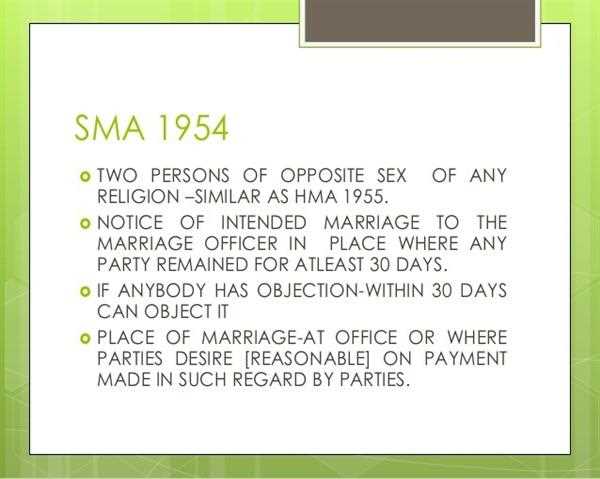The Special Marriage Act of 1954 is a law in India that allows for civil marriages outside of the traditional religious ceremonies. This act was introduced in order to provide a legal framework for marriages between individuals of different religions or castes.
Under the Special Marriage Act, couples can get married without having to conform to the customs and traditions of their respective religions. The act also allows for inter-caste marriages, which were previously not recognized by the law.
To get married under the Special Marriage Act, couples need to give notice of their intention to marry to the Marriage Officer of the district in which one of them has resided for at least 30 days prior to the notice. After the notice period, the Marriage Officer will examine the parties and their witnesses, and then issue a certificate of marriage.
The Special Marriage Act also provides for the registration of marriages. Couples can apply for a marriage certificate from the Marriage Officer of the district in which the marriage was solemnized. The certificate serves as proof of marriage and can be used for various legal purposes, such as applying for a passport, opening a joint bank account, or applying for a visa.
One of the main advantages of the Special Marriage Act is that it allows couples to get married without having to convert to each other's religion. This can be especially beneficial for couples who want to maintain their own religious beliefs and traditions.

The act also provides for a legal framework for resolving disputes that may arise between married couples. The act allows for either spouse to apply for divorce on various grounds such as adultery, cruelty, desertion, conversion to another religion, unsoundness of mind, or venereal disease.
However, there are certain restrictions under the Special Marriage Act. For instance, the parties must be of marriageable age, which is 21 years for the groom and 18 years for the bride. In addition, the act prohibits marriages between close relatives and requires the consent of both parties to the marriage.
In conclusion, the Special Marriage Act of 1954 is an important law in India that allows for civil marriages between individuals of different religions or castes. It provides a legal framework for such marriages and allows couples to maintain their own religious beliefs and traditions. While there are certain restrictions under the act, it remains an important tool for promoting inter-faith and inter-caste marriages in India.